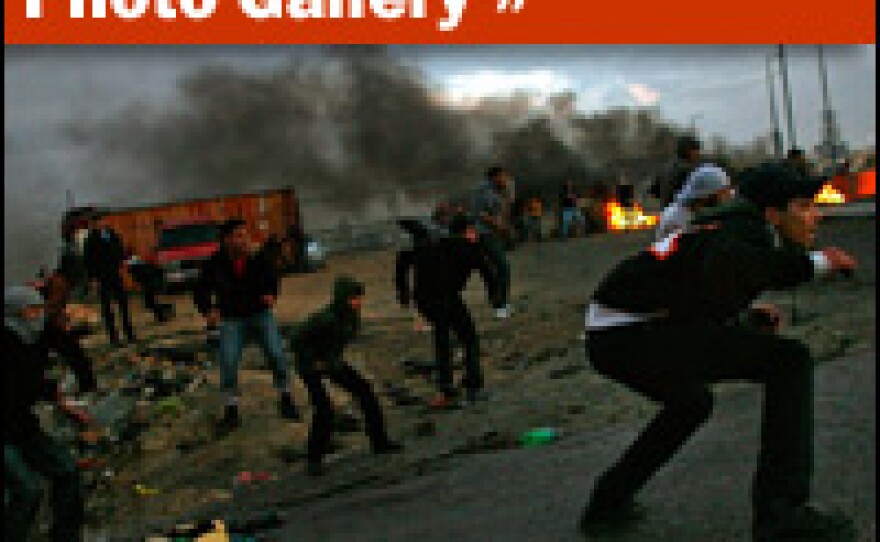Israel's aerial offensive in the Gaza Strip has eased a little, resulting in fewer Palestinian casualties Tuesday. The bombing of Gaza continued, however, as did rocket fire from Gaza into southern Israel.
Gaza medical officials say more than 370 Palestinians have been killed so far in the four-day assault. Four Israelis have died in rocket and mortar fire from Gaza.
Behind Israel
Levi Gavai lives in the Israeli town of Sderot, which borders Gaza and has taken heavy rocket fire for months. Gavai, who works in a nearby kibbutz, says he is firmly behind his country's assault on Gaza.
Asked about the rising civilian casualty toll just across the border, Gavai says it is regrettable.
"If innocent civilians are getting hurt, I'm sorry about it," he says. "We're not targeting them. We are targeting Hamas.
"But when they shoot at Sderot, they are targeting civilians not soldiers. Israel cannot stand by while its cities are being bombarded," he says.
The Israeli air force expanded its target list Monday and Tuesday, striking the homes of Hamas and other militant leaders in Gaza. Tuesday's bombings reduced several government ministries to rubble. The Islamic University, targeted earlier in the airstrikes, was bombed again. More targets mean a deeper fear for Gaza civilians. Few of the territory's 1.5 million residents are moving around by day, and hardly anyone dares to move at all at night.
Uncertainty In Gaza
Gaza resident Hossam al Madhoun says people are afraid that someone in an apartment next to them might be targeted next — perhaps a member of Hamas' armed wing, the Izzedine al Kassam Brigades.
"It's not easy to figure what's safe and what's not anymore," he says. "You don't know if your neighbor is a leader of al Kassam or not. These people are undercover. They start to target mosques and ministries. The Ministry of Culture was bombarded! Who would ever think that the Ministry of Culture would be bombarded?"
That uncertainty is likely part of the psychological warfare side of Israel's campaign, meant to weaken popular, grassroots support for Hamas. Already it has had a devastating effect on civilians.
Madhoun says the attacks have badly shaken his wife and young daughter.
"I don't know how much damage my daughter had in her mind with all of this ... violence," he says. "I don't know. My wife cannot hide it. ... She cries in fear and panic."
Most Israelis solidly back their government's campaign. But the question some are asking is whether the Jewish state can actually bomb its way to a new security situation with Gaza's Islamist rulers.
Military Solution?
Israeli political analyst Yaron Ezrahi says the rocket fire on Israeli communities is intolerable and no state could allow it to continue. He says, however, clear political and diplomatic tracks are needed alongside the military one — even through a third party. Ezrahi says he sees none of that so far.
"Common sense and expertise make it very clear that there is no military solution," he says.
Ezrahi argues that Hamas' power and support are so entrenched in Gaza society through its social, religious and educational arms that military force alone simply cannot undermine the militant group. He also questions the Israeli government's assumption that a harsh, sustained attack on Hamas targets will prompt more ordinary Gazans to turn against the group.
"It seems to me that the Israeli action is more likely to trigger a consolidation of the hatred and hostility of the civilian population in Gaza against Israel and generate a thousand more potential suicide bombers from the age of five to a much older age," Ezrahi says.
Copyright 2022 NPR. To see more, visit https://www.npr.org. 9(MDAzMjM2NDYzMDEyMzc1Njk5NjAxNzY3OQ001))







